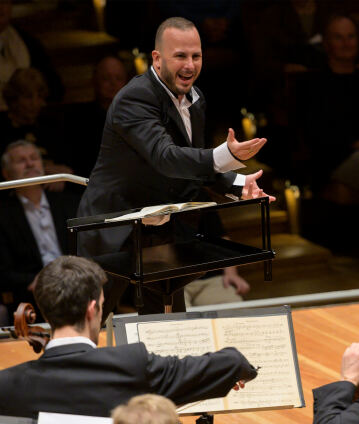Yannick Nézet-Séguin conducts Debussy and Prokofiev

The culmination of this concert with Yannick Nézet-Séguin is Sergei Prokofiev’s Fifth Symphony, a both overpowering and vivid work, which also includes “the primitive nature of Russian song ... in its melodies” (A. Khachaturian). The French-Canadian Nézet-Séguin opens the concert with French repertoire: Maurice Ravel’s charming Menuet antique and Claude Debussy’s dazzling La Mer – a masterpiece of musical Impressionism.
Yannick Nézet-Séguin, who was born in Montreal, Canada in 1975, made his conducting debut with the Berliner Philharmoniker in October 2010 with music by French and Soviet composers: the programme included works by Hector Berlioz, Olivier Messiaen and Sergei Prokofiev. Nézet-Séguin, who not only heads the Philadelphia Orchestra and the Rotterdam Philharmonic Orkest, but will also take over as the head of the New York Metropolitan Opera from September 2018, follows a similar direction in these concerts.
The first part of the programme features a key work of French Impressionism: La Mer by Claude Debussy. In every orchestral colour imaginable, the score, described by its composer as “three symphonic sketches”, reflects the impressions of nature that Debussy gathered including while on holiday on the English coast of the Channel. Completed in 1905 in Eastbourne, it was premiered in Paris in the same year by the Orchestre Lamoureux under the musical direction of Camille Chevillard. La Mer is one of the masterpieces of Impressionism because the score, despite its figurative titles, positions itself in a sophisticated manner on the borderline between programme and absolute symphonic music.
The counterpoint in these concerts to the iridescent tones of Debussy is a composition that is committed to the aesthetic maxims of so-called “Socialist Realism”: Sergei Prokofiev’s Fifth Symphony, which was premiered in Moscow on 13 January 1945. This work not only meant the composer’s return to the symphonic form after almost 15 years, but also earned Prokofiev the Stalin Prize 1st Class. The composer himself stated that with his Fifth Symphony he wanted to “sing of the free, happy man, his mighty power, his chivalry, and his purity of spirit”. The work’s premiere, which was temporarily interrupted by anti-aircraft artillery salvoes from the Kremlin, made a more unequivocal impression on the pianist Sviatoslav Richter: “The Fifth Symphony,” said Richter, contains “time and history, the war, the motherland and victory”. About Debussy, however, Richter said that in his music there were “no personal feelings. It is stronger than nature itself. If you look at the sea, you will not have as strong a sensation as when listening to La Mer”.
© 2019 Berlin Phil Media GmbH
Related interviews
Artists
Our recommendations
- Yannick Nézet-Séguin conducts Brahms’s “Ein deutsches Requiem”
- Yannick Nézet-Séguin makes his debut with Berlioz and Prokofiev
- Yannick Nézet-Séguin conducts works by Tchaikovsky and Ravel
- Yannick Nézet-Séguin and Beatrice Rana
- Yannick Nézet-Séguin conducts Mahler and Reinicke
- Yannick Nézet-Séguin and Lisa Batiashvili